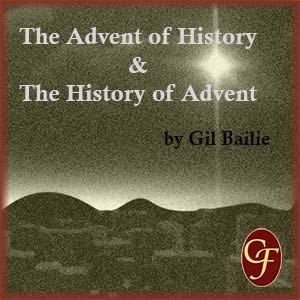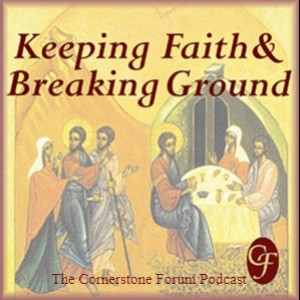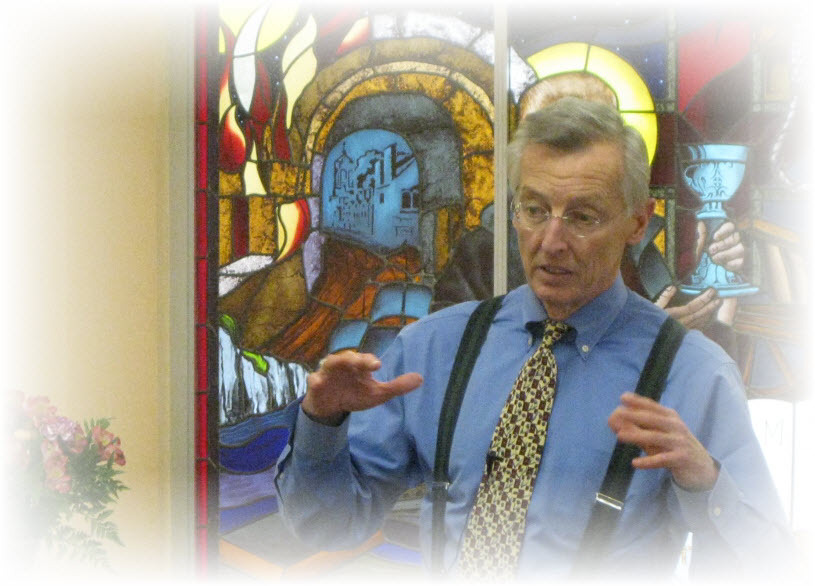Episodes

Wednesday Aug 18, 2021
Wednesday Aug 18, 2021
History actually has a history. It was not always the case that humans lived in history. That is what lies behind the idea of ‘pre-historic’ human experience which was purely cyclical and mythic in nature. With the advent of the biblical God’s call to Abram to come out of his ‘pre-historic’ culture the human race begins a journey towards an unknown horizon.
This journey’s path leads to the Advent of an incarnation in Bethlehem, through the dusty roads of Roman Judea where death from crucifixion opens a tomb and ultimately to the parousia and revelation of Jesus Christ as the universal Lord of history.
Advent is the road for those with a journey to make.

Tuesday Aug 17, 2021

Monday Aug 16, 2021
Monday Aug 16, 2021
As Enlightenment modernity has been gradually but relentlessly dissolving the sacramental sensibilities that are so indispensable to authentic Christian existence, post-Enlightenment postmodernity has been forfeiting the anthropological sensibilities which are enshrined in the formal sacraments and without which civilization will inevitably collapse. Without sacramental sensibilities we lose a sense of grace, and without Anthropological sensibilities we lose a sense of nature – human nature. Whatever particular tasks Christians may be called to undertake, their perennial task is to recognize and bear witness to the relationship between nature and grace – and between this world and the next. The Eucharist is where the Christian both participates in this mystery and is nourished for the work of witnessing to it.

Sunday Aug 15, 2021
Sunday Aug 15, 2021
“The knowledge of what it means to be a person,” wrote Romano Guardini, “is inextricably bound up with the Faith of Christianity.” The word “person” entered into the vocabulary of Western culture only after Christian theologians, in speaking of the three Persons of the Trinity, gave the word persona a philosophical profundity never before associated with it. In achieving this milestone in theological anthropology, the theologians of the fourth and fifth centuries laid the groundwork for a revolution in human self-understanding which it may be the special privilege of 21st century Christianity to rediscover.

Saturday Aug 14, 2021
Saturday Aug 14, 2021
Without the bodily Resurrection of Christ, Christianity would not exist, and where this article of faith is diminished – by condescendingly referring, for instance, to Resurrection “experiences” – faith itself slowly dissolves or degenerates into some form of Gnosticism. The antidote to this and the key to rediscovering the gigantic meaning of the Resurrection is to recognize its Trinitarian backdrop, and for that in part 6 of this series Gil Bailie will turn to the Holy Saturday theology of Hans Urs von Balthasar.

Friday Aug 13, 2021
Friday Aug 13, 2021
Perhaps the single-most important theological question in Christianity is: what is the relationship between the death of Christ on the Cross and the forgiveness of sins and the redemption of the human race? René Girard’s contribution to this question is indispensable to the task which the Second Vatican Council implicitly assigned to us, namely, that of developing a theological anthropology. In part 5 of this series Gil Bailie will look to Girard’s work and suggest some of its surprising – and surprisingly orthodox – theological implications.

Thursday Aug 12, 2021
Thursday Aug 12, 2021
What we know by faith is real knowledge, even though this knowledge was not acquired scientifically or according to strictly secular rationality. What we know by faith is that we have been saved from sin and death by the Incarnation, the Crucifixion, and the Resurrection. In part 4 of this series Gil Bailie reflects on the Incarnation. The Milky Way is an Intergalactic Nazareth if ever there was one, as insignificant in cosmic terms as is our solar system within it. How laughable it is to think – murmur the skeptics – that God – if there is one – would be the least bit interested in the biochemical and moral anomalies occurring in some remote region of some remote galaxy.

Wednesday Aug 11, 2021
Wednesday Aug 11, 2021
What is history? When does history begin? We live in a time of extraordinary material improvements – however unequally enjoyed and fraught with unanticipated consequences. Nonetheless, someone as astute as Henri de Lubac can assert that we live in a time of “deliberate barbarism” precisely to the degree that we are guilty of the “deliberate refusal of history.” In part 3 of this series Gil Bailie will accept the challenge implicit in de Lubac’s critique and reflect on the nature and meaning of human history.

Tuesday Aug 10, 2021
Tuesday Aug 10, 2021
The bedrock of scriptural, Judeo-Christian anthropology is that humans are made in the image and likeness of God. While non-biblical religions and secularists regard such a statement as naïve and ludicrous, in part 2 of this series Gil Bailie discusses how, once this fundamental insight is given the theological specificity it receives in light of the Christian revelation – the Trinitarian nature of God – it becomes the single-most salient touchstone for understanding the origin and meaning of human existence.

Monday Aug 09, 2021
Monday Aug 09, 2021
Neither the New Testament nor the words of Christ can be cited as evidence for the idea that with the passing of time the moral predicament of fallen humanity would improve and the world’s resistance to Christ and the Church would diminish. The scriptural evidence, on the contrary is that history consists – in the words of Hans Urs von Balthasar – of the mutual intensification of the Yes and the No to Christ, a view made anthropologically cogent by René Girard’s extraordinary insights into history and culture. In part 1 of this series Gil Bailie situates the challenges facing contemporary Christianity within the context of this scriptural, Balthasarian and Girardian view of the human predicament.

Keeping Faith & Breaking Ground
Without Christianity neither the nature of the present crisis of culture nor the meaning of history itself can be properly comprehended. If the Christian revelation is to come to our aid in this moment of peril, we must learn to account for its sweeping claims in ways that are faithful to Church teachings, intellectually cogent, morally rigorous, charitable, anthropologically sound, and undeterred by the moribund spirit of our age.



